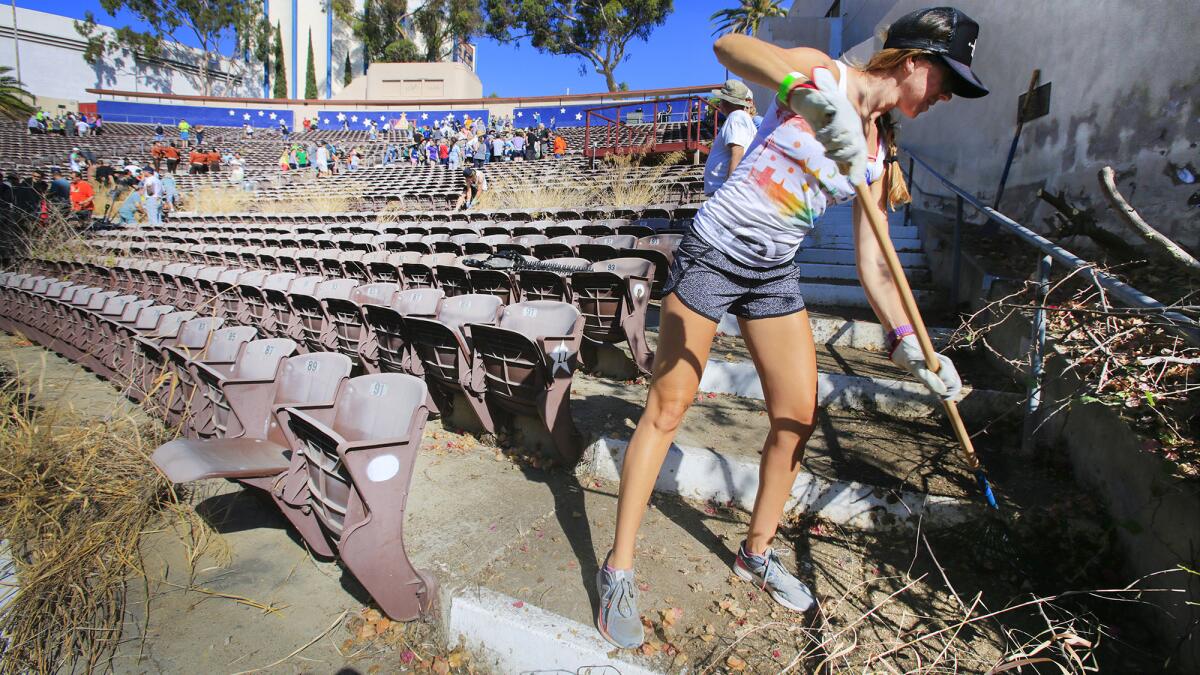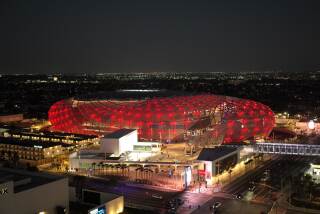Fans of San Diego’s Starlight Bowl hope to revive shuttered amphitheater

Under a blazing hot sun, nearly 300 volunteers swept, raked, shoveled and scrubbed the long-shuttered San Diego’s Starlight Bowl into near-shipshape this weekend.
The unexpectedly large crowd turned out Saturday to support the newly organized Save Starlight campaign, a grass-roots group of theater lovers and historians who hope to restore the Balboa Park amphitheater.
Built as The Ford Bowl for the 1935-’36 California Pacific International Exposition, the city-owned theater closed in 2012, a victim of changing theatrical tastes, budget gaps, disrepair and its unfortunately noisy location under the flight path for Lindbergh Field.
Among the many dozens of volunteers shoveling drifts of leaves from under the theater’s 3,500 seats was 78-year-old John Drehner Jr. of North Park. The first show he saw at the bowl was the “Song of Norway” in 1947, when his father, violinist John Drehner Sr., joined the theater’s pit orchestra. Drehner Sr. continued to play at the bowl until he died in 1968, so his son said he sees Starlight as a part of his family and cultural heritage.
“I used to come back when the only planes flying over were propeller planes, and then the jets came in, and then they multiplied until there were 250 to 300 a day and you couldn’t hear yourself think,” Drehner Jr. said. “I understand why they had to close it, but I sure would love to see it come back.”
The campaign to reopen Starlight is being spearheaded by Steve Stopper, who worked as the audio technician at Starlight Theatre, the organization that ran the renamed Starlight Bowl from the 1950s until it filed for bankruptcy five years ago. Last year, Stopper pressured the city to end Starlight theater’s lease on the amphitheater so a new organization could renovate it and get it running again. When that lease was finally terminated a few weeks ago, the Save Starlight committee organized Saturday’s “reverse gardening” party.
Although the cleanup quickly cleared the property of weeds and debris, the job of restoring Starlight will take time and money. The property’s stage needs repairs, the sound and lighting equipment are outdated and vandals have painted graffiti and caused superficial damage to the walls and fences. For a time, homeless men were living in the dressing rooms and growing marijuana under lights.
Even last week, when city officials reopened the gates for the cleanup, they chased off two men inside the stage house. But overall, the structure is sound and with TLC it can live again, said Jeff Van Deerlin, the city’s program manager for Balboa Park.
City Councilman Todd Gloria, whose district includes Balboa Park, was among the volunteers digging out chest-high weeds from the amphitheater’s west hillside Saturday. He said the big crowd of volunteers reflects the community’s love for the park.
“It shows how the city and community have worked together for 100 years to make Balboa Park a better place,” he said. “These people are writing a new chapter in the park’s history.”
Many cleanup volunteers came because they said they hated seeing Starlight go to waste. Downtown retiree Ingrid Galchenko, who was scrubbing years of grime off a row of the hard plastic folding seats, said she’d been attending Starlight shows since she moved to San Diego in 1981 and was eager to see it revived.
Wielding a shovel nearby, North Park actor Ron Choularton — who performed in three shows at Starlight in the early 2000s, including as Fagin in “Oliver” — said he misses how families would picnic and play soccer on the grass outside before the shows.
Save Starlight member Welton Jones, a longtime local theater critic who first reviewed “Flower Drum Song” there in 1966, said Starlight has had many periods of boom and bust. Its heyday was in the 1950s and ‘60s, when there was a lack of family-friendly competition and a bounty of new musicals coming from Broadway. But as new local theaters emerged and the plane noise grew, Starlight started to decline. A dome was considered, new venues around town were tested and the famous “freeze frame” (where actors held in place as planes roared overhead) was introduced. But eventually, Jones said, “they finally ran out of answers.”
Councilman Gloria said that by the end of this year the city hopes to begin accepting lease bids for the property. Stopper runs a nonprofit arts careers school and may be among the applicants. His plan to reopen Starlight would involve a new Coachella festival-style sound system and a radical rethinking of its programming. He proposes a mix of 100 shows a year by a coalition of community groups, schools and nonprofits presenting community theater, dance, concerts, magic shows, open mike nights and more.
“Our biggest issue is to overcome the impression that we can’t do anything here,” Stopper said.
Two of Save Starlight’s committee members, attorney Dan Woodard and PR executive Susan Clausen, said they appreciate Stopper’s community-focused vision. Clausen said Stopper realizes that trying to re-create the old Starlight, which produced Broadway-style musicals, no longer works in today’s market, so he’s open to new and different ideas.
Woodard — who said he’s known the energetic Stopper since 1963 — says he has no ego, so his motivation is not simply to win the lease but to get the city’s wheels rolling again.
“He’s not in this for himself. He’s just got the attitude, ‘Let’s take this city-owned asset, clean it up, give it back and and see who can do the best job running it,’” Woodard said.
Among the believers is Steve Karo, who was a percussionist in the Starlight band from 1971 to 1991 (his wife Mary was also a Starlight concertmaster). A decade ago, Karo led the successful renovation of the once-derelict Balboa Theatre in the Gaslamp Quarter. On Saturday, he was on hand for the first steps of what he hopes will be Starlight’s new life.
“This is historic,” Karo said. “We were fighting an uphill battle with the Balboa and people said it was a piece of junk. But we did it. And we can do it here too.”
Kragen writes for the San Diego Union Tribune
More to Read
Sign up for Essential California
The most important California stories and recommendations in your inbox every morning.
You may occasionally receive promotional content from the Los Angeles Times.










